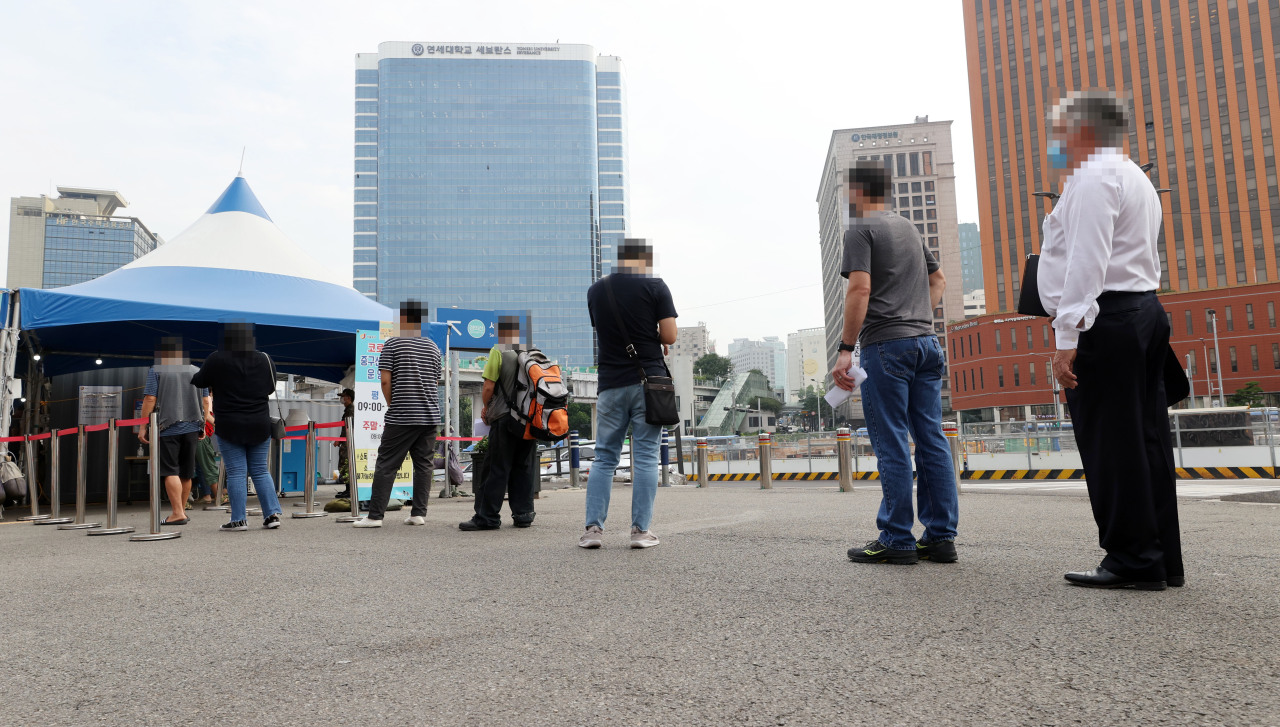
Citizens wait in line to receive COVID-19 tests at a makeshift clinic in central Seoul on Monday. (Yonhap)
South Korea's daily new coronavirus cases fell below 1,400 on Tuesday due to fewer tests over the weekend, but health authorities are facing hurdles in flattening the curve ahead of the Chuseok holiday.
The country added 1,372 more COVID-19 cases, including 1,333 local infections, raising the total caseload to 251,421, according to the Korea Disease Control and Prevention Agency (KDCA). Daily cases have stayed above 1,000 for 56 consecutive days.
Tuesday's tally marked a drop from 1,619 on Sunday and 1,487 on Monday. The number of patients normally falls over the weekend and rises later in the week as more people get tested, often breaching the 2,000 mark.
The country added one more deaths from COVID-19, raising the death toll to 2,285, the KDCA said.
The number of patients with serious symptoms across the country reached 409, up 13 from the previous day. Critical patients have more than tripled from some 120 in early July, when the fourth wave began.
Amid no signs of a significant letup, South Korea decided to add more strings to the social distancing measures applied to the greater Seoul area, allowing restaurants and bars to have only take-away customers after 9 p.m.
The current social distancing measures are set to run through Sunday.
On Friday, health authorities plan to announce additional guidelines that will go into effect next week, ahead of Chuseok, which runs from Sept. 18-22 this year, when millions travel across the nation to meet families and relatives.
A total of 29 million people, or 56.5 percent of the population, have received their first shots of COVID-19 vaccines, and only 15.2 million people, or 29.6 percent, have been fully vaccinated, the KDCA said.
The country plans to provide at least one jab to 70 percent of the population by the end of September to create herd immunity in November.
The country decided to provide booster shots to those who have been fully vaccinated during the fourth quarter, to raise its guard against variant strains of COVID-19.
Those who have been excluded from the inoculation program, including pregnant women and younger children, will also receive jabs later in the year.
Of the newly confirmed domestic cases, 452 were from Seoul, 420 from the surrounding Gyeonggi Province and 72 from the western port city of Incheon, the authorities said.
Imported cases, which include South Korean nationals, came to 39.
The total number of people released from quarantine after making full recoveries was 221,701, up 1,343 from the previous day. (Yonhap)



![[KH Explains] No more 'Michael' at Kakao Games](http://res.heraldm.com/phpwas/restmb_idxmake.php?idx=645&simg=/content/image/2024/04/28/20240428050183_0.jpg&u=20240428180321)


